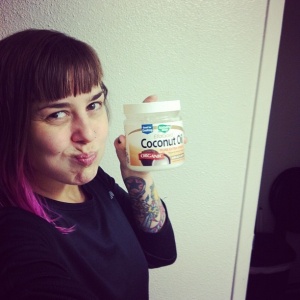Oil Pulling Side Effects
Oil pulling (also called Kavala Graha and Gandusha) has become all the rage. Since I started oil pulling myself I thought I should figure out if there are any oil pulling side effects that I should worry about.
In this article, we will see if any of these “side effects” are something to worry about.
Here is the list of the Top 14 “bad” Oil Pulling Side Effects:
- Just doesn’t work
- Stop using other treatments that work
- Can contain harmful additives
- Could cause lipoid pneumonia
- Relying on oil pulling delays finding real issues
- High MCT (medium-chain triglyceride) levels, may cause hangover symptoms
- Dry mouth
- Excessive thirst
- Muscular stiffness
- Exhaustion
- Loss of sensation or taste in the mouth
- Can cause sinus drainage
- Jaw soreness
- Can trigger gag reflex
Do You Want the SAFEST Oil Pulling Product on the Market?
Many of these oil pulling side effects are limited to only specific types of oil. Here is the list of oils that people have tried with oil pulling:
- Coconut Oil
- Sunflower Oil
- Sesame Oil
- Olive Oil
- Palm Oil
- Safflower Oil
Now that we have the list of oil pulling side effects, lets dig deeper into each claim to see if there is really anything to worry about.
Are These Bad Side Effects Real?
With our list of oil pulling side effects defined, let’s research each of them and see if anything we throw up against the wall sticks.
Just Doesn’t Work

“Trying oil pulling thanks to @closedblueyes’ encouragement” by jessica mullen (CC BY 2.0), via Flickr.com
When looking up studies for oil pulling side effects, the results are conflicting.
In a study “Tooth brushing, oil pulling and tissue regeneration: A review of holistic approaches to oral health“, this research found another study where oil pulling using sesame seed oil did find “There was a statistically significant reduction of the pre- and post-values of the plaque and modified gingival index scores in both the study and control groups (p < 0.001 in both)”.
In another study “Effect of coconut oil in plaque related gingivitis — A preliminary report” that used coconut oil for the oil pulling, it found that “Reliability of clinical examination was tested for all the days of assessment and the interexaminer reliability was found to be substantial to good”.
The folks at LiveScience found several other studies that seemed to also confirm that oil pulling does work. But, found that each of the studies had flaws that gave doubt to their reliability.
Stop Using Other Treatments that Work
I can definitely see how this can happen.
Just to be clear here, the other treatments we’re talking about here are brushing and flossing your teeth, and using mouthwash.
At least for me, if I’m doing two things that attempt to accomplish the same thing, I might keep doing them for a little while. But, if it becomes a hassle (takes too much time, hurts, costs more), I’ll probably start making excuses like “I don’t need both…”.
Of course, for me, the one that will be dropped is the one that is more difficult and less pleasing.
So, the plan for me is to keep this in the back of my mind. And, to make sure I don’t stop doing the other things. Or, if I do, it’s a conscious decision where I’m keeping track of when I stopped, and what the results are after I stop.
On a side note, between brushing, flossing and using mouthwash, it only makes sense that if you are going to stop doing one of these, that mouthwash is the one. They are very similar actions after all. And, brushing and flossing provide abrasive benefits that a mouthwash just doesn’t.
Can Contain Harmful Additives

“Teeth” by dalvenjah (CC BY-SA 2.0), via Flickr.com
For this one, we will need to get into what type of oil you might use for you oil pulling.
You will also need to do some research on the specific brand you are buying.
Some manufacturers use harmful chemicals to perform the extraction or to refine the oil.
Sometimes extra virgin olive oil can be one particular oil that runs into this. The “extra virgin” part pushes the manufacturer to use processes that may not end up being the most healthy for you.
There have also been rumors about the use of chemicals in the drying process to extract Safflower Oil.
Could Cause Lipoid Pneumonia
First of all, what is lipoid (somtimes called lipid) pneumonia, you ask?
The technical definition from Wikipedia is basically that it is a form of lung inflammation that occurs when animal fat, vegetable or mineral oil, or in this case the oil being used for pulling, is breathed into the lung.
If you are not careful, then this is something that can definitely occur.
And, if you are swishing your oil for periods of 15 minutes while you “go about your business”, then the risk is greater.
In my opinion (just my opinion), how often do you personally accidentally have food or water go down the “wrong” pipe. If it happens to you on a regular basis, then you should probably pass. If it never happens to you, then your risk is reduced.
Just realize that I AM SAYING: use oil pulling at your own risk! I am not a doctor and am not claiming that you will be immune to oil pulling side effects! So, only do it if you’ve done the research and are happy with your findings.
Relying on Oil Pulling Delays Finding Real Issues

“Similing Horse” by zpics (CC BY-ND 2.0), via Flickr.com
The folks at Skeptoid wrote an article about how oil pulling might make you feel better even though you might have other issue.
I mean, surely that guy in the image over there still has problems!
The worry here is that if you start to feel better, then you might stop taking doctor prescribed medications, or stop other treatments that you really shouldn’t stop because they might still be needed.
The bottom line here is to have these conversations with your doctor when you are getting the prescription. Ask questions like “if I feel better should I stop taking these?”.
If you don’t know if you should stop or not, give the doctor a call before making a change. You might not be able to talk to the doctor right away, but most doctor offices will take your questions to the doctor during their breaks between patients and get the answers you are looking for.
So, for me, this shouldn’t be an issue. You are either the type of person that listens to their doctor and follow their instructions, or you aren’t. Just because you are also oil pulling, you shouldn’t be changing your doctor’s advice on your own.
Also, my doctor’s nurse asks me what medications or supplements I’m taking each time I visit (just to make sure it still matches their records). I always mention the prescriptions I’m taking and the vitamins or other supplements I take on a regular basis. My doctor appreciates it and it helps to give them a more well rounded view on possible reason for ailments you might have.
Causes Hangover Symptoms

“sick” by Joan Valencia (CC BY-SA 2.0), via Flickr.com
Is it “possible” that oil pulling can make you sick as a dog?
I was a little surprised when I found this “possible negative” to oil pulling.
I’ve seen some people mentioning that oil pulling can cure your hangover.
So, I was a little curious when I saw someone mention that it could give you a hangover.
As it turns out, coconut oil and palm oil provide medium-chain triglycerides (MCTs).
According to the folks at Cleveland Clinic Wellness, some of the side effects of MCTs are “stomach upset and diarrhea. Less common oil pulling side effects include vomiting, irritability, nausea, gas, and essential fatty acid deficiency”.
Other “hangover” symptoms that have been reported are exhaustion and muscle stiffness (two of the possible side effects from our initial research).
However, the difference between consuming these oils when mixed in with food, and swishing these oils around in your mouth and then spitting them out should be substantial.
So, if you are experiencing these types of symptoms, try to make sure you aren’t swallowing the oil. Or, if the symptoms are consistent, maybe try some of the other oils listed above.
The bottom line is listen to your body!
If every time you oil pull, you get sick. Then, STOP IT!
Dry Mouth
There is some anecdotal evidence that some people do get “dry mouth” after they oil pull.
However, many more claim the opposite.
This article by Fox4 in Kansas City where they interviewed Dr. Amala Guha, assistant professor of immunology and medicine at the University of Connecticut Health Center and the founding president of The International Society for Ayurveda and Health.
The article claims Dr. Guha states that users have seen dry mouth using coconut oil. However, Dr. Guha also states that these symptoms are seen “if improper technique is used”.
Excessive Thirst

“Five Thirsty Little Kittens” by VasenkaPhotography (CC BY 2.0), via Flickr.com
This is basically a symptom of having a dry mouth.
If you are one of the people who try oil pulling and end up with a dry mouth, this will make you extra thirsty.
Should you become very thirsty from oil pulling (or really any reason), you need to be careful that you don’t end up drinking too much to compensate.
You can actually drink yourself to death.
No joke!
Read this article if you think you might be drinking too much water (or other liquid). It describes the symptoms like confusion, disorientation, nausea, and vomiting.
One of the problems with drinking too much is that by the time you might realize you’re doing it, your mental state is affected and you can’t really rely on your own faculties to do what it takes to seek medical help or to stop drinking more.
From an oil pulling standpoint, this does appear to be something that affects a certain percentage of people.
Should you be one of them, dry switching from one type of oil to another, or switch oil brands to see if that particular oil or brand of oil you are using has something in it besides the oil that is causing the excess thirst.
Also, make sure you are using “proper techniques” as improper oil pulling can lead to excessive thirst.
Loss of Sensation or Taste in the Mouth
After extensive searching on this topic, I found several web sites that discuss the side effect of possible loss sensation, or the loss of taste.
But, each source I found can only be traced back to a single interview by the same Dr. Guha we mention earlier.
In that interview by Fox 13 in Kansas City, Fox reports that “Guha also warns that there can be negative side effects if improper technique is used, including dry mouth, excessive thirst, muscular stiffness, exhaustion and loss of sensation or taste in the mouth”.
Unfortunately, these statements were not followed up with references to back up those claims.
We’ve gone over some of these claims in the article above where additional sources reinforce the specific side effect.
However, we haven’t found any government studies that back this up, or any other articles (besides ones that point to Dr. Guha’s statements).
So, if this is a real side effect, it must not be happening very often, or it would have been easier to find something about real experiences from people about this.
Can Cause Sinus Drainage

“A very runny nose” by Nic McPhee (CC BY-SA 2.0), via Flickr.com
For some this is a good thing. For others not so much.
One of the big claims from oil pulling is that is can cure sinusitis. Coconut oil is reported by many to be the oil of choice that has this effect.
But, for others, sinus drainage is the result.
If you find that your sinuses drain excessively after you pull oil, it’s likely you are having an allergic reaction to either the oil, or some other substance that is included in oil you are using.
While some think that sinus drainage is just your body trying to get rid of bad toxins (there is truth to that). Excessive sinus drainage can cause horrible symptoms and/or side effects:
- Congestion
- Difficulty breathing
- Headaches
- Nighttime cough
- Pneomonia
- Runny nose
So, if you can’t find the right brand of oil, or type of oil that doesn’t cause sinus drainage, then maybe oil pulling isn’t for you.
Jaw Soreness
When you first start to do oil pulling, your muscles are not “in shape”.
So, it is very natural that you feel some soreness.
Typically the more you do oil pulling, the more “in shape” those muscle become, and the soreness goes away. At this point you jaw muscles are actually much stronger.
But, some folks have physical issues that can contribute to jaw soreness.
Conditions like TMJ (temporomandibular joint) or other structural conditions could mean that you might not be able to work through the pain.
Some suggestions I’ve seen are to try and build up to longer periods of time by pausing and letting your jaw rest after it becomes sore and then continuing again. The idea is that you stop and start during one session to get to the longer period of time.
Gag Reflex

“oh hai, i has no gag reflex” by Lindsey Turner (CC BY 2.0), via Flickr.com
I have seen several reports of people having a gag reflex to oil pulling.
Different people do have different tastes. So, it is very natural that you might not react well to either the oil or brand of oil that you are using.
What I’ve seen during my research is that the oil is too hard to even pull. Or, too thick.
This could just be the product you are using. The coconut oil I use (see the link at the beginning of this article), is almost creamy. And, it takes about 2 seconds for it to be completely liquid after I put it into my mouth. I can’t imaging anyone have a gag reflex from that product.
If you have already bought the oil you want to use, then perhaps 15 seconds in the microwave might be what you need to liquefy your oil. The thinner the oil, the less likely it will cause a gag reflex.
Again, I hate to sound like a broken record (for those of you under 15, you might say “what is this record thing he’s talking about?), but if one oil or brand of oil is giving you a gag reflex, then another type of oil, or another brand of oil might be what you need.
I can tell you that my wife bought a different brand of coconut oil from CostCo, and while it doesn’t give me a gag reflex, it doesn’t make me want to continue to use it. The coconut oil I use from Viva Labs is more than pleasant. It’s downright tasty.
I use it to pop popcorn when I’m not oil pulling with it.
Earache
If you are swishing violently enough, or if you have sinus drainage sometimes those eventually lead to an earache.
There are reports from oil pulling users that after oil pulling that within an hour they begin to experience an earache.
There are many reports from oil pullers that when they first started out, they thought they needed to really “work it”. So, they would go all out with the swishing and end up getting a headache or earache.
So, those of you thinking about trying oil pulling, take it slow. Listen to your body when it tells you to stop. Work your way up if you want to do 15 or 20 minutes (even though some experts say four minutes is enough).
Improper Techniques
Many of the bad oil pulling side effects we talk about in this article are only talked about occurring “if improper technique is used”.
The two more well know techniques for oil pulling are Kavala Graha and Gandusha.
Both are part of the system of medicine called Ayurveda. Ayurveda originated in India and is often considered an “alternative medicine” in the Western world.
Kavala Graha
Kavala Graha, or sometimes just called Kavala or Kavalagraha, is the practice that takes an oil and swishes it around in your mouth to cleanse your dosha, which fights many of the oil pulling side effects talked about above.
For those of you not in the “know”, Ayurveda medicine defines three bodily “bioelements” that make up a person’s constitution.
The kavala cleanse is used to remove toxins that keep your dosha from being in proper balance.
The technique is very straight forward and is described in more detail by Bess O’Conner, a certified Ayurvedic and Holistic Health Practitioner here. Here are her high level steps:
- Swish 1-2 tablespoons of oil as you would mouthwash.
- Start with shorter times (5 minutes) and work your way up to 15-20 minutes.
- After time is up, spit the oil out into your trash can.
- Use a tongue scraper to removed excess toxins that might be left.
- Brush with an Ayurvedic, flouride-free toothpaste.
During the swishing phase, some recommend to focus on moving the liquid between your teeth.
I’ve also seen others recommend to rinse your mouth with salt water to complete the cleanse.
Gandusha
For proper Gandusha treatment, the main difference between Gandusha and Kavala Graha, is that with Kavala Graha, you put less oil in your mouth to allow for room to swish.
For Gandusha, the idea is that you fill your mouth completely (no room for swishing), and the oil is just held and just soaks your teeth and gums.
Tamil and Sri Lanka
Both Tamil and Sri Lanka are strongholds for Gandusha and Kavala Graha beliefs. Oil Pulling is actively practiced in both regions and flourishes to this day.
How About the Kids?
NO!!!!
While many report that oil pulling is basically “safe”. Many of the oil pulling side effects that have been found have to do with not following the right procedures.
If anyone is going to get something like oil pulling wrong, it going to be a child.
So, our recommendation is that you wait until you children come of age (18 years old), and then you can teach them and they can then annoy you (again) because they’ll have some other new-fangled new age medicine trick that is much better.
Conclusions About Oil Pulling
When I first started working on this article, I was thinking I was going to be recommending that the oil pulling side effects out weigh the benefits.
However, the more I dug into the details of each side effect, the more it became clear that the side effect could likely be avoided by just using common sense.
Do You Want the SAFEST Oil Pulling Product on the Market?
Personally, I’m going to continue to oil pull using my Viva Labs coconut oil I ordered from Amazon (this last time I ordered the giant size to save some money) in spite of the oil pulling side effects we’ve researched. I’m not convince yet that there are truly benefits. But, I am convinced that, for me (you have to make the decision on your own), that the possible rewards out weigh the risks of getting any of these oil pulling side effects.
Sorry, the comment form is closed at this time.